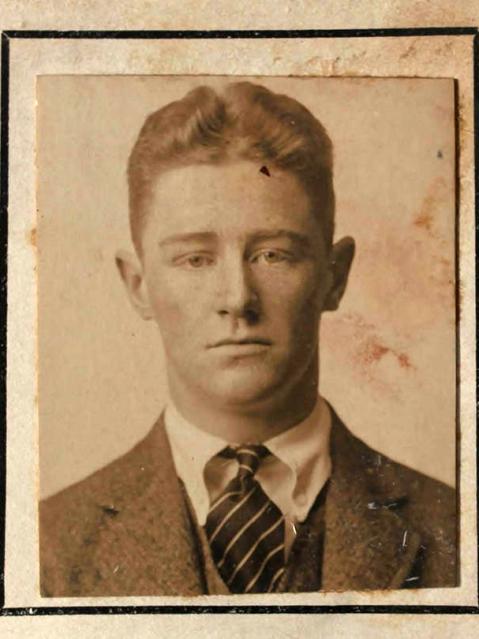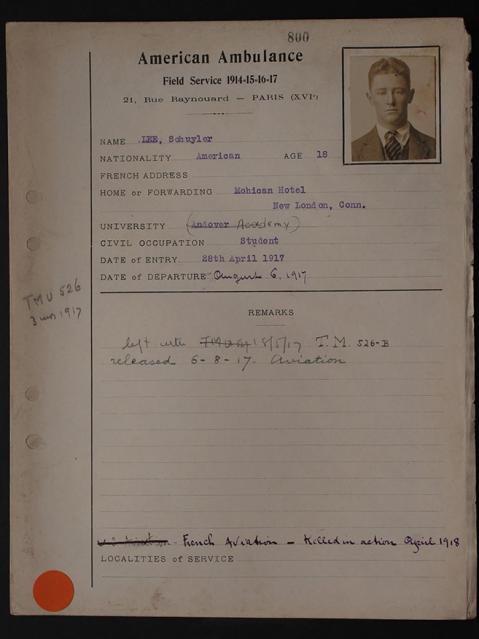Lee, Schuyler
- Who
- WWI driver
- When
- WWI
- Where
- France
- Education
- Haverford; Andover '18
Born July 29, 1898, in Bloomfield, New Jersey. Son of Reverend J. Beveridge and Mynna Greenman Lee. Home, New London, Connecticut. Educated German-English Academy, Milwaukee (Wisconsin); Latin School, Chicago; Haverford School, Pennsylvania, and Phillips Academy, Andover, Class of 1918. Joined American Field Service, April 28, 1917; attached Transport Section 526 to August 6, 1917. Enlisted French Aviation, Lafayette Escadrille. Breveted October 22, 1917. Trained Avord, Tours, Pau, and le Plessis-Belleville. Caporal, Spad Escadrille 96, January 10, 1918. Shot down and killed, April 12, 1918, east of Montdidier, Somme. Croix de Guerre with palm, and two citations. His grave has not been found.
SCHUYLER LEE has been described by one of his instructors at Andover as "handsome, "Apollo-like," but he, like Rupert Brooke, would have abhorred the thought of being remembered by such fame. Rather must we think of him in the words of Dr. Stearns, the Head-Master of Phillips Academy, as "clean, strong, and unsullied."
Schuyler was still at the "school on the hill" when the call to service came to him, and there his memory will always be cherished as one of its most precious heritages. He was a member of the K. O. A. Society, and a deacon in the Academy Church, sincere and manly in his beliefs, with the courage to act always in accordance with them. When Dr. Stearns considered the formation of the Andover Unit for the American Ambulance Field Service, Schuyler was one of the first to whom he turned, and his trust was not misplaced.
With the majority of his unit upon arriving in France, Schuyler joined the camion branch of the American Field Service, with which he remained until August, when he was accepted for the Lafayette Flying Corps, and enlisted as a private in French Aviation. From Avord and Tours and Pau he wrote enthusiastic, joyous letters relating his progress in flying and telling of the fascination that his new work held for him. From Pau he went to Plessis-Belleville, near Paris, where finished aviators awaited their assignment to combat groups, and thence to the front with Escadrille 96, which was destined to be practically annihilated in the dark days that were soon to come.
He quickly fell in with the life of the Escadrille, of whose record he was very proud, chafing only at the delay before he was allowed to go out seeking combat, instead of merely guarding other planes. On February 6th, he wrote in his matter-of-fact way of a fight for which he was later cited:
"I had my first fight on the morning of the 3rd of February. Five French and eight Boches were in it. Three of the men with me got one, while one of our men was shot down. It is a totally new and unpleasant feeling to go out with a fellow and come back without him." On his return to the field, he found that his Spad had been perforated in twenty places by machine gun bullets.
When the Germans drove toward Amiens in March, Escadrille 96 was summoned hastily to the northern battle line and took part in the intensive battles of that month. On April 12, while flying east of Montdidier, on patrol, Lee's motor, which had been giving him a great deal of trouble, must have failed him, for he was last seen slowly descending into the German lines. The German casualty lists reported him as shot down in combat, and since then his wrecked Spad has been found and identified half a mile northeast of Beuvraignes, Somme.
He died the way he would have liked,--- in the performance of his duty. As a friend of his said, trying to be reconciled to his loss,--- "Schuyler's death was wonderful! Young, clean, ardent---suddenly in mid-air."
A French officer, pilot in the same escadrille, wrote of Schuyler to his father --- "A perfect gentleman and model soldier, your son had won the affection and the sympathy of every one here. I can't tell you enough how much all here, officers and men, feel the loss of such a perfectly gallant comrade."
As Major Fuess, who knew and loved Schuyler, said in his admirable book "Phillips Academy, Andover, in the Great War" "he lived true to his favorite passage in poetry:
Live pure, speak true, right wrong, follow the King ---
Else, wherefore born?
- Tribute from Memorial Volume of the American Field Service, 1921
WWI File
- Months of service
- 3, 1917
- Section(s)
- T.M.U. 526
- Home at time of enlistment
- New London, Conn., USA
- Subsequent Service
- French Aviation


